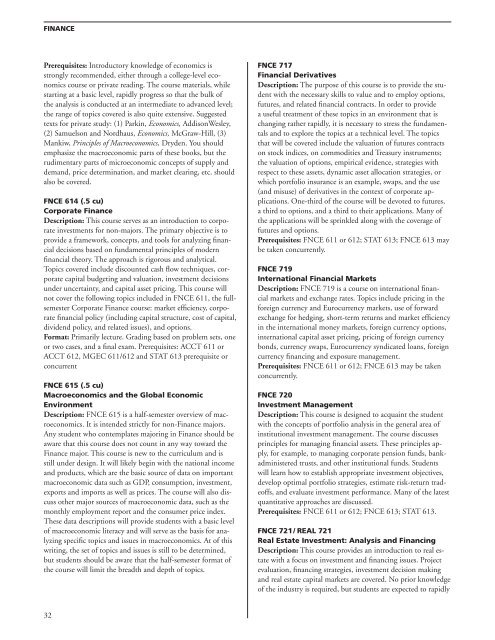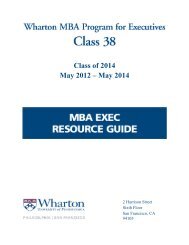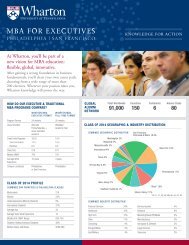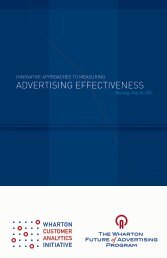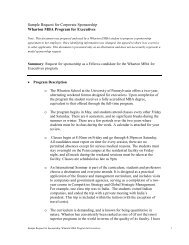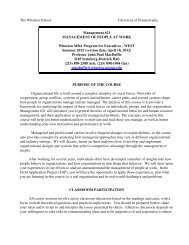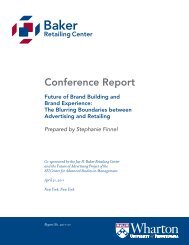Explore Options; Plan Your MBA Academic Program
Explore Options; Plan Your MBA Academic Program
Explore Options; Plan Your MBA Academic Program
Create successful ePaper yourself
Turn your PDF publications into a flip-book with our unique Google optimized e-Paper software.
FINANCE<br />
Prerequisites: Introductory knowledge of economics is<br />
strongly recommended, either through a college-level economics<br />
course or private reading . The course materials, while<br />
starting at a basic level, rapidly progress so that the bulk of<br />
the analysis is conducted at an intermediate to advanced level;<br />
the range of topics covered is also quite extensive . Suggested<br />
texts for private study: (1) Parkin, economics, AddisonWesley,<br />
(2) Samuelson and Nordhaus, economics, McGraw-Hill, (3)<br />
Mankiw, Principles of Macroeconomics, Dryden . You should<br />
emphasize the macroeconomic parts of these books, but the<br />
rudimentary parts of microeconomic concepts of supply and<br />
demand, price determination, and market clearing, etc . should<br />
also be covered .<br />
FNCE 614 ( .5 cu)<br />
Corporate Finance<br />
Description: This course serves as an introduction to corporate<br />
investments for non-majors . The primary objective is to<br />
provide a framework, concepts, and tools for analyzing financial<br />
decisions based on fundamental principles of modern<br />
financial theory . The approach is rigorous and analytical .<br />
Topics covered include discounted cash flow techniques, corporate<br />
capital budgeting and valuation, investment decisions<br />
under uncertainty, and capital asset pricing . This course will<br />
not cover the following topics included in FNCE 611, the fullsemester<br />
Corporate Finance course: market efficiency, corporate<br />
financial policy (including capital structure, cost of capital,<br />
dividend policy, and related issues), and options .<br />
Format: Primarily lecture . Grading based on problem sets, one<br />
or two cases, and a final exam . Prerequisites: ACCT 611 or<br />
ACCT 612, MGEC 611/612 and STAT 613 prerequisite or<br />
concurrent<br />
FNCE 615 ( .5 cu)<br />
Macroeconomics and the Global Economic<br />
Environment<br />
Description: FNCE 615 is a half-semester overview of macroeconomics<br />
. It is intended strictly for non-Finance majors .<br />
Any student who contemplates majoring in Finance should be<br />
aware that this course does not count in any way toward the<br />
Finance major . This course is new to the curriculum and is<br />
still under design . It will likely begin with the national income<br />
and products, which are the basic source of data on important<br />
macroeconomic data such as GDP, consumption, investment,<br />
exports and imports as well as prices . The course will also discuss<br />
other major sources of macroeconomic data, such as the<br />
monthly employment report and the consumer price index .<br />
These data descriptions will provide students with a basic level<br />
of macroeconomic literacy and will serve as the basis for analyzing<br />
specific topics and issues in macroeconomics . At of this<br />
writing, the set of topics and issues is still to be determined,<br />
but students should be aware that the half-semester format of<br />
the course will limit the breadth and depth of topics .<br />
32<br />
FNCE 717<br />
Financial Derivatives<br />
Description: The purpose of this course is to provide the student<br />
with the necessary skills to value and to employ options,<br />
futures, and related financial contracts . In order to provide<br />
a useful treatment of these topics in an environment that is<br />
changing rather rapidly, it is necessary to stress the fundamentals<br />
and to explore the topics at a technical level . The topics<br />
that will be covered include the valuation of futures contracts<br />
on stock indices, on commodities and Treasury instruments;<br />
the valuation of options, empirical evidence, strategies with<br />
respect to these assets, dynamic asset allocation strategies, or<br />
which portfolio insurance is an example, swaps, and the use<br />
(and misuse) of derivatives in the context of corporate applications<br />
. One-third of the course will be devoted to futures,<br />
a third to options, and a third to their applications . Many of<br />
the applications will be sprinkled along with the coverage of<br />
futures and options .<br />
Prerequisites: FNCE 611 or 612; STAT 613; FNCE 613 may<br />
be taken concurrently .<br />
FNCE 719<br />
International Financial Markets<br />
Description: FNCE 719 is a course on international financial<br />
markets and exchange rates . Topics include pricing in the<br />
foreign currency and Eurocurrency markets, use of forward<br />
exchange for hedging, short-term returns and market efficiency<br />
in the international money markets, foreign currency options,<br />
international capital asset pricing, pricing of foreign currency<br />
bonds, currency swaps, Eurocurrency syndicated loans, foreign<br />
currency financing and exposure management .<br />
Prerequisites: FNCE 611 or 612; FNCE 613 may be taken<br />
concurrently .<br />
FNCE 720<br />
Investment Management<br />
Description: This course is designed to acquaint the student<br />
with the concepts of portfolio analysis in the general area of<br />
institutional investment management . The course discusses<br />
principles for managing financial assets . These principles apply,<br />
for example, to managing corporate pension funds, bankadministered<br />
trusts, and other institutional funds . Students<br />
will learn how to establish appropriate investment objectives,<br />
develop optimal portfolio strategies, estimate risk-return tradeoffs,<br />
and evaluate investment performance . Many of the latest<br />
quantitative approaches are discussed .<br />
Prerequisites: FNCE 611 or 612; FNCE 613; STAT 613 .<br />
FNCE 721 / REAL 721<br />
Real Estate Investment: Analysis and Financing<br />
Description: This course provides an introduction to real estate<br />
with a focus on investment and financing issues . Project<br />
evaluation, financing strategies, investment decision making<br />
and real estate capital markets are covered . No prior knowledge<br />
of the industry is required, but students are expected to rapidly


